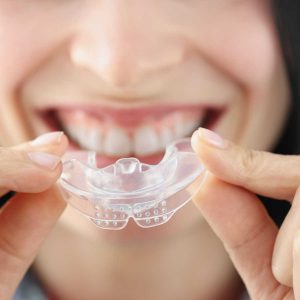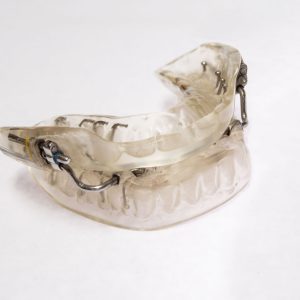Protect Your Smile & Your Overall Health
If you’re looking for ways to protect your teeth or address issues like sleep apnea, oral appliances and mouthguards may be the solutions you need. These two dental devices are commonly used to address various dental conditions, but they serve different purposes. In this helpful guide, the Farmington dentists at Desert Hills Dental explain the differences between these two devices, how they can help protect and improve your oral health, and how to care for them to ensure the best results.
What are Oral Appliances and Mouthguards?
Oral appliances and mouthguards are both dental devices that can be customized to fit your mouth. Mouthguards are typically made of soft, pliable materials and are worn over your teeth to protect them from trauma. They’re often worn during sports to protect against impact damage.
Oral appliances, or dental splints, are often used to treat sleep apnea and TMJ (temporomandibular joint disorder). These devices are made of hard plastic and are worn over your teeth while you sleep to keep your airway open or to correct your bite alignment. They can also be used to protect against nighttime teeth grinding (bruxism). Both oral appliances and mouthguards are simple and relatively affordable devices, which can help prevent the need for more costly and invasive treatments down the line.
Types of Mouthguards
Mouthguards come in different types, and each type serves a specific purpose. Here are some of the most common types of mouthguards:
Stock Mouthguards
Stock mouthguards are the most affordable type of mouthguard and are available in most sporting goods stores. These mouthguards are pre-formed and come in various sizes, but they don’t provide a perfect fit.
Boil-and-Bite Mouthguards
Boil-and-bite mouthguards are also available in sporting goods stores but offer a better fit than stock mouthguards. To use a boil-and-bite mouthguard, you need to boil the device in water to soften it and then bite down on it to mold it to your teeth.
Custom-Fitted Mouthguards
Custom-fitted mouthguards provide the best fit. These mouthguards are created from an impression of your teeth taken by your dentist. Custom-fitted mouthguards offer the most protection against damage from bruxism and trauma but may be more expensive than over-the-counter options.
Types of Oral Appliances
Like mouthguards, oral appliances come in different types. Here are the most common types of oral appliances:
Mandibular Advancement Device (MAD)
A mandibular advancement device (MAD) is the most common type of oral appliance used to treat sleep apnea. It’s designed to push your lower jaw forward, which helps keep your airway open while you sleep.
Tongue-Retaining Device (TRD)
A tongue-retaining device (TRD) is another type of oral appliance used to treat sleep apnea. It holds your tongue in place, which helps keep your airway open.
TMJ Appliances
TMJ appliances are oral devices used to treat temporomandibular joint disorder (TMJ). These appliances can help align your jaw and reduce pain and discomfort associated with TMJ.
Protecting Your Oral Health with Mouthguards
Mouthguards protect your teeth from trauma. Here are some benefits of wearing a mouthguard:
- Preventing chipped, broken, or knocked-out teeth
- Reducing the risk of jaw injuries
- Reducing the risk of concussion
- Reducing headaches caused by bruxism
- Improving sleep quality
Treating Sleep Apnea and TMJ with Oral Appliances
Oral appliances can treat sleep apnea and TMJ. Here are some benefits of using oral appliances:
Treating Sleep Apnea
Sleep apnea is a common sleep disorder characterized by repeated pauses in breathing during sleep. These pauses can last for several seconds and can occur many times during the night. If left untreated, sleep apnea can lead to serious health problems such as high blood pressure, heart disease, and stroke.
Oral appliances can help treat sleep apnea by keeping your airway open while you sleep. They do this by repositioning your jaw or tongue, which prevents your airway from collapsing. Oral appliances are often recommended for people with mild to moderate sleep apnea who can’t tolerate continuous positive airway pressure (CPAP) therapy.
Treating TMJ
TMJ disorders affect the temporomandibular joint, which connects your jawbone to your skull. TMJ can cause pain and discomfort in your jaw, face, neck, and shoulders, as well as headaches and difficulty chewing.
Oral appliances can help treat TMJ disorders by repositioning your jaw and reducing the strain on your TMJ. By doing so, oral appliances can relieve pain and discomfort associated with TMJ.
Caring For Oral Appliances and Mouthguards
Proper care of your mouthguard or oral appliance can prolong its lifespan and ensure it remains hygienic. Here are some tips for keeping both devices clean:
- Rinse your mouthguard or appliance with water after every use to remove any debris or saliva.
- Clean your mouthguard or appliance using a soft-bristled toothbrush and mild soap solution. Avoid using toothpaste, which can scratch the surface of the appliance.
- Store your appliance in a clean, dry container to prevent bacteria buildup.
- Don’t expose your mouthguard or appliance to high temperatures or direct sunlight, as this can cause it to warp or discolor.
- Visit your dentist regularly to have your mouthguard or oral appliance checked for any signs of wear and tear. Your dentist may recommend replacing your device if it’s no longer effective or comfortable.
Frequently Asked Questions
Yes, you can wear a mouthguard with braces. However, it’s recommended to use a custom-fitted mouthguard, as stock or boil-and-bite mouthguards may not fit properly over braces.
In many cases, oral appliances for sleep apnea and TMJ are covered by insurance. It’s best to check with your insurance provider to see what’s covered under your plan.
Yes, you’ll need a prescription from a dentist or doctor to get an oral appliance. This is to ensure that the appliance is the right fit for your mouth and that it’ll effectively treat your condition.
The lifespan of a mouthguard or oral appliance depends on how often it’s used and how well it’s cared for. Custom-fitted mouthguards can last up to several years, while oral appliances typically need to be replaced every few years. It’s important to follow the dentist’s or manufacturer’s recommendations for replacement and care.
Protect Teeth & Improve Sleep, Call Us & Learn More!
Oral appliances and mouthguards are essential dental devices that can help protect and treat your oral health. These simple devices are easy to use and affordable, helping patients keep their smiles and their overall health in optimal condition.
If you’re experiencing sleep apnea or TMJ issues or simply want to protect your smile, call Desert Hills Dental Care by calling (505) 327-4863. You can also request an appointment by clicking the button at the bottom of the page and one of our friendly team members will get back to you shortly. Desert Hills Dental Care is proud to serve new and returning patients from Farmington and surrounding areas such as Kirtland, Spencerville, and Bloomfield, NM.

